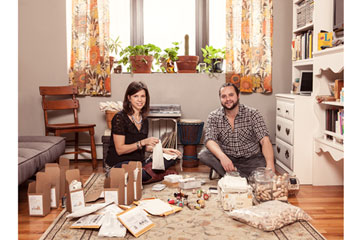
(3 of 6)
There were deep contradictions in this growth, and Kalin's obvious ambivalence about commercial success made him an awkward fit with Silicon Valley and Silicon Alley. "I speak to people in the business world and technology world, but I don't admire them," Kalin said in an interview for Inc. magazine in 2011. (He did not respond to Time's requests for an interview.) In a blog post about the big infusion of venture capital, Kalin compared Etsy to the heroes of a children's book, Swimmy, about small fish that join forces to scare away a big tuna. The company would not strive "to be a big tuna fish," Kalin wrote. "Those tuna are the big companies that all us small businesses are teaming up against." Within nine months of Accel and Union Square's investment, Kalin was out as CEO; he briefly took back the reins, but in 2011 he ceded the role to the company's chief technology officer, Chad Dickerson, a former Yahoo executive.
The early skirmishes of the handmade wars were already under way. Etsy's user forums began to see postings by customers and merchants who complained that Etsy's management played favorites among sellers by glamming up bigger producers in splashy features on its home page, where shoppers couldn't miss them. When they didn't get satisfaction from Etsy, some of the complainers turned up the volume, setting up blogs and spin-off sites--one is called Etsybitch--where disgruntled Etsians could freely criticize top sellers. Of all the attacks that could be launched, one soon became the artisanal world's equivalent of the nuclear option: accusing a top Etsy merchant of reselling manufactured goods with a handmade look and a misleading backstory.
Thus was launched the Battle of the Boat-wood Benches, which was fought last summer and would prove to be one of the most bitter conflicts in the artisanal wars. The flash point was a successful Etsy seller called Ecologica Malibu. Run by Mariana Schechter, 31, it had all the trappings of a handicrafter's utopia: a young Brazilian designer building rustic, eco-friendly furniture from reclaimed nautical wood and selling it out of her painterly studio in Malibu, Calif. Schechter also ran a brick-and-mortar store in Malibu and says she initially listed her sun-washed wooden mirrors, shelves and media consoles on Etsy as an afterthought on a friend's suggestion.
Etsy shoppers couldn't get enough of Schechter's furniture. Within two months, the pieces were selling so well that Etsy contacted her about featuring Ecologica Malibu on its home page. "I got a lot of big clients from places like New Balance and Google from listing on Etsy that were ordering 100 pieces at a time," Schechter says.
To the roaming truth squads out in Etsyland, that sudden prosperity smacked of pseudocraftsmanship--or worse, flat-out evidence of a big business. Purists were already irked that Etsy had begun loosening its rules to allow bigger sellers on the site. They soon began questioning Schechter's bona fides in forum postings. "It's a wonder how you balance your life as a mother, business woman, and still have time to hand craft so many furniture pieces," one reader commented. Another got right to the point: "Mariana, do you make the work yourself?"
